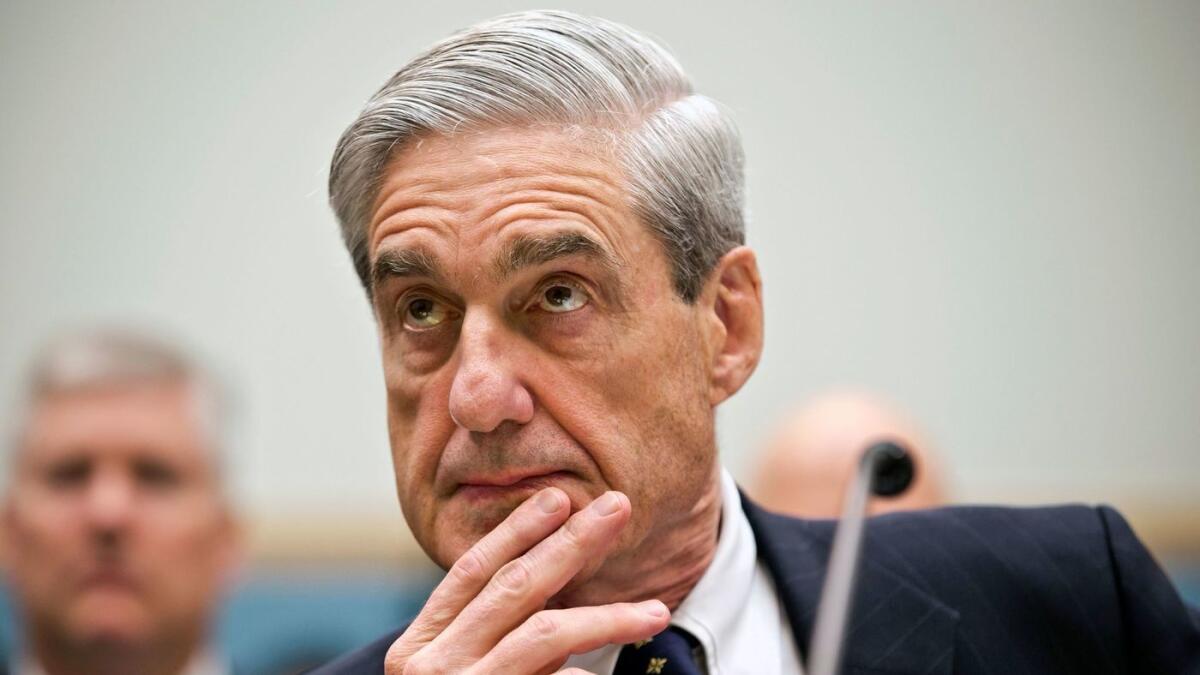Putin offered to help with the Russia investigation. Don’t expect Mueller to take him up on it

- Share via
Reporting from Washington — Before the end of Monday’s news conference, Russian President Vladimir Putin offered to do a favor for special counsel Robert S. Mueller III.
Russian authorities, Putin said, would be happy to interview the dozen intelligence officers indicted on Friday for hacking emails from Hillary Clinton’s campaign and the Democratic Party.
After all, Moscow is “perfectly able to do this questioning and send the appropriate materials to the United States,” he said while standing next to President Trump in Helsinki, Finland.
That appeared to be the “interesting idea” of Putin’s that Trump referred to during the session. The proposal, however, almost certainly landed with a thud in the special counsel’s office. Although some law enforcement cooperation can occur even between adversarial countries like the United States and Russia, it’s unlikely that this is one of those situations.
For starters, Putin’s idea falls far short of actually sending any of the indicted Russians to the U.S. for trial. Moreover, Putin has denied that his government worked to undermine the 2016 presidential election, the very issue Mueller is investigating. And the probe involves sensitive counterintelligence work — not the kind of thing U.S. officials would be eager to give Russia a peek into.
“Vladimir Putin would love to add a GRU or FSB officer to Mueller’s team,” said David Kris, a former assistant attorney general for national security, referring to two Russian intelligence agencies by their acronyms.
Kris, who founded the Culper Partners consulting firm, said Putin’s offer is “not to be taken seriously.”
The special counsel’s office declined to comment.
The indictment announced Friday named a dozen Russian officers from the Main Intelligence Directorate, or GRU, and charged them with conspiracy, identity theft and money laundering. According to prosecutors, they used specially designed malware to penetrate Democratic computer networks and extract secret files. Then they created a fictitious online persona, Guccifer 2.0, and distributed the documents to organizations such as WikiLeaks.
U.S. intelligence agencies have said Putin personally ordered the election operation, but he acted unaware of it during Monday’s news conference.
“I don’t know the full extent of the situation, but President Trump mentioned this issue, and I will look into it,” he said.
Putin also elaborated on his proposal to help with the U.S. investigation. If Mueller wanted, he could send representatives “and they will be present for this questioning” of the Russian intelligence officers.
But that deal would require a concession, Putin said, and U.S. officials would have to help with cases that Moscow is pursuing.
“We would expect that the Americans would reciprocate and that they would question officials including the officers of law enforcement and intelligence services of the United States, whom we believe have something to do with illegal actions on the territory of Russia,” he said. “And we have to request the presence of our law enforcement.”
Putin specifically singled out the case of William F. Browder, 54, the American-born, British financier who has led a global human rights campaign against the Kremlin and who has long been a Putin target.
For a time in the 1990s and early 2000s, Browder’s Hermitage Capital Management was the largest portfolio investor in Russia. After he accused prominent Russian companies of corruption, he was barred from the country in 2005. One of his lawyers, Sergei L. Magnitsky, was later arrested and tortured in a Russian prison for nearly a year before dying in custody in 2009.
In 2012, Congress passed legislation named after Magnitsky that imposed sanctions against a large number of prominent Russians close to Putin. The following year, a court in Moscow convicted Browder, in absentia, on tax charges. He says the conviction was fraudulent.
Putin seemed to suggest that U.S. law enforcement officials would have to assist in Russia’s pursuit of Browder in return for Russian cooperation with the Mueller investigation.
Follow the latest news of the Trump administration on Essential Washington »
Twitter: @chrismegerian
UPDATES:
3:25 p.m.: This article was updated to include an explanation of Putin’s accusations against William Browder.
This article was originally published at 2:50 p.m.
More to Read
Get the L.A. Times Politics newsletter
Deeply reported insights into legislation, politics and policy from Sacramento, Washington and beyond. In your inbox twice per week.
You may occasionally receive promotional content from the Los Angeles Times.










